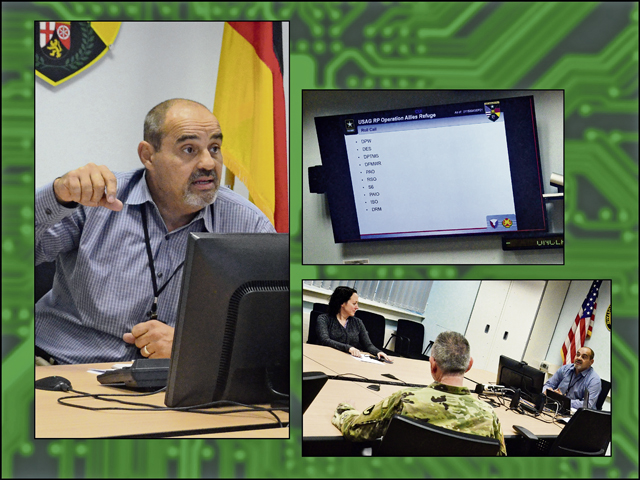
In the world of computer gaming, the best personal computers are rigs with the ability to process massive amounts of data and turn that into breakneck performance and victory. The central processing unit, or CPU, which runs the whole show, usually dictates performance.
As the focus of Operation Allies Refuge has shifted from Ramstein Air Base to U.S. Army Garrison Rheinland-Pfalz’s Rhine Ordnance Barracks, the power to analyze tasks and turn that data into action has never been more critical. The Army site near Kaiserslautern has become a hub as evacuee operations continue, and as many as 5,000 travelers call this place a temporary home.
Enter the garrison’s Emergency Operations Center. The EOC stems from the Directorate of Plans, Training, Mobilization, and Security and is the CPU of this operation, executing incoming instructions, turning them into garrison performance. EOCs are formed around emergent crises and events as dictated by the garrison commander.
The EOC consists of about 20 representatives from affected garrison directorates who serve as a single focal point for incoming and outgoing garrison-related tasks during OAR.
Henry Kaaihue, DPTMS director, said as Operation Allies Refuge has scaled up here, so have the responsibilities of the EOC and his behind-the-scenes operations team.
“This is a vital military mission,” he said. “Everyone on the team is working very hard to ensure safety and security of personnel and to show that we can achieve success on all fronts of garrison support.”
The seven-days-a-week EOC operation is, in gamer jargon, ’overclocked,’ meeting twice a day on the third floor of the garrison headquarters building. EOC members gather to review massive tasks lists and assess the situation. Many have at least one mobile phone, sometimes two, and one is either ringing or in use. They are also in constant contact via email 24 hours a day.
Every good CPU needs a lot of RAM, or random access memory. So, DPTMS manages tasks on a running spreadsheet. Tasks are coded like traffic lights to indicate their status: red, amber, or green, updated during the daily meetings. The current list runs about 50 deep, from extending hours of operation at gyms to coordinating barracks support for supporting Army and Navy units.
Linked at the hip with the EOC, the DPTMS operations division is the “task manager.” Like a Windows operating system’s Task Manager — monitoring and controlling the various applications and processes — DPTMS ops collects and controls all garrison tasks and requests for support. The team then analyzes and assigns them to the appropriate directorate. Ops also monitors resources and manpower in use, determines priorities and decides which directorate or task requires more attention. Ops then levies the appropriate bandwidth via the EOC.
George Brown III, a retired Army officer and Afghanistan veteran, represents the garrison’s Directorate of Public Works on the EOC. He said flexibility has been vital to getting things done, and there’s always something new.
“I have an alarm set on my phone every 15 minutes,” Brown said. “It reminds me how often things can change.”
Across the ’motherboard’ of this operation, action is confined to four of the garrison’s 31 sites: Rhine Ordnance Barracks (the central location where travelers stay) as well as Sembach Kaserne, Miesau Ammo Depot, and Baumholder Military Community, where supporting forces bunk. The garrison may use buildings and resources on Pulaski Barracks later if needed.
Efforts by military, civilians, and contractors are all considered as the EOC makes calls on things like heating living facilities, police and fire activities, safety inspections, and more.
Lee Lewis, the Directorate of Emergency Services representative for the EOC, said the military police portion of the effort has been bustling.
“Our support to Operation Allies Refuge has been multi-faceted, and it’s a mission every single one of our team members is proud to carry out,” he said. “This is truly a joint, team effort across many agencies.”
Brown said as DPW has success in completing tasks and capitalizing on opportunities, so goes the garrison. “The whole DPW Team has been so very understanding with all the changes and has a lot of pride in the opportunity to bring the solutions to help. I spent a year in Afghanistan working directly with many wonderful locals. It hurts to see what is going on now over there, but at least I am still able to help with this operation,” he added.
After each day’s second meeting, Kaaihue provides garrison leaders with a ‘boots-on-the-ground’ assessment of garrison support. Garrison leadership’s feedback fuels future tasks and how overall garrison support for OAR — led by the 21st Theater Sustainment Command — rolls on.
“It’s vital the commander has a no-kidding assessment — exact and complete — of what’s happening. We want to ensure he can provide the most accurate updates up and down the chain of command, and we want to ensure we are executing this mission with success,” Kaaihue said.
Col. Vance J. Klosinski, USAG Rheinland-Pfalz garrison commander, praised the EOC’s performance in achieving the Installation Management Command-Europe mantra of ‘Ready Garrisons.’
“Everyone from the garrison working on this mission understands the urgency. Our team is ready for this mission and is proceeding with professionalism, agility, and speed,” Klosinski said. “The work the EOC and so many in the garrison has done has been remarkable.”


